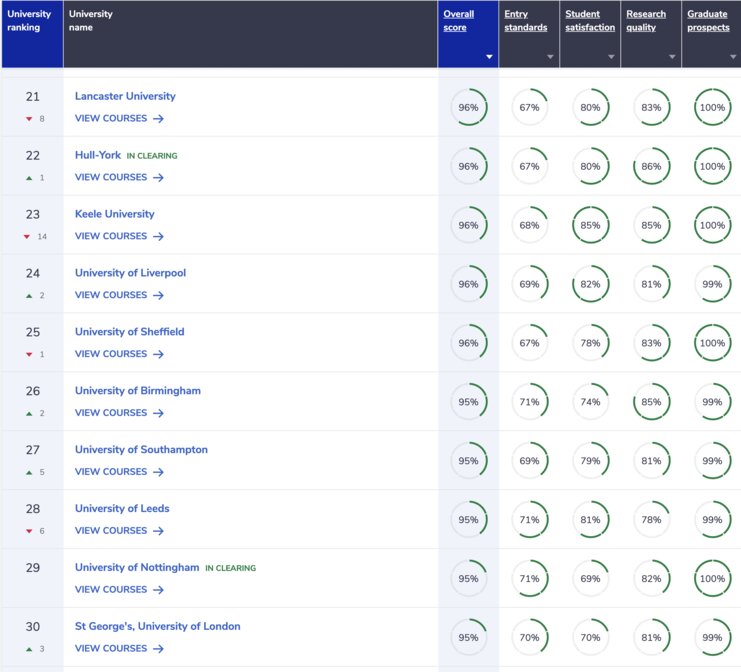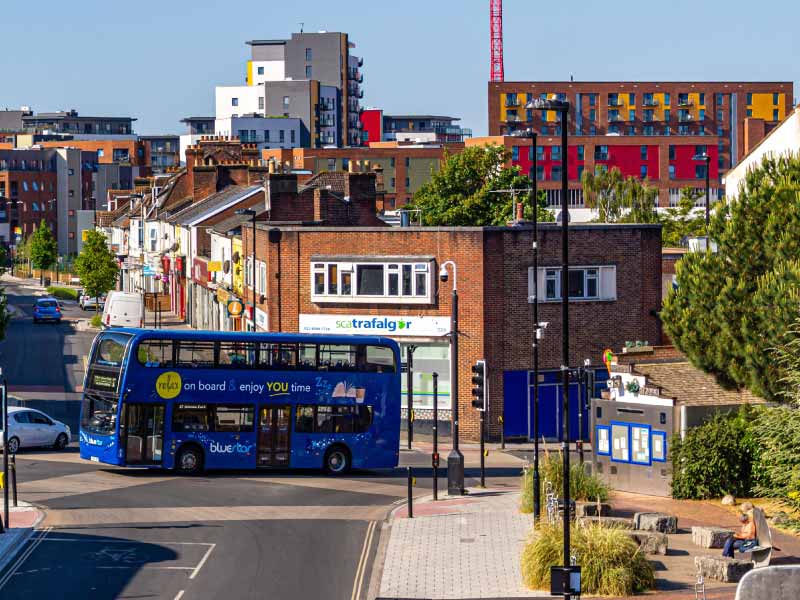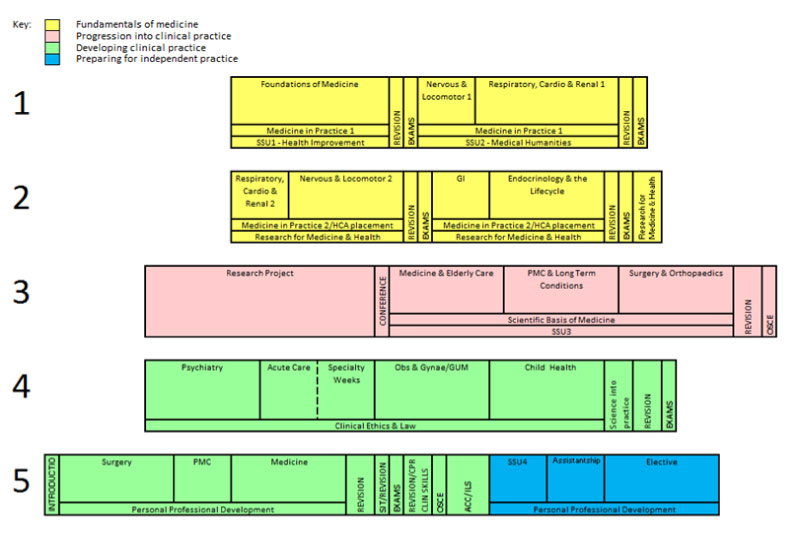Welcome to our UK Medical School Review series. In this series, we work with current students to produce an in-depth overview of each UK Medical School, covering what it is like to study there, how the course looks and what you need to get in.
Today, we are focussing on Southampton Medical School, a founding member of the Russell Group of UK research-intensive universities. Phoebe, a fourth-year Southampton Medic, will share her experiences and insights as a current student throughout.
Let’s get started with an overview of Southampton Medical School…
Overview Of Southampton Medical School
About Southampton Medical School
University of Southampton’s Medical School history dates back to 1968 when the Royal Commission on Medical Education recommended increasing the number of medical schools within the UK to account for the growing need for doctors. In 1971 the Medical School was opened, initially with 40 students enrolled. Today, this has expanded to 1470 students.
Nowadays, Southampton Medical School also offers 5 different undergraduate medical programmes, all leading to the award of a medical degree, BMBS (Bachelor of Medicine, Bachelor of Surgery). These include the standard 5-year programme (BM5), 4-year graduate-entry programme (BM4), widening access to Medicine 6-year programme (BM6), and 2 international programmes: BM(EU) programme that runs a partnership with a healthcare provider in Germany and BM(IT) programme for students who want to be transferred in Year 3 at IMU Malaysia.
Southampton
Medical School

- University Age: 159
- UK Ranking: 27th
- Pint Price: £3.00
- Alumni Notability: 8/10
- A-level Requirements: AAA
- Places Available: 250
- Applicant Success Rate: 11%
- Teaching Style: Integrated
- Interview Style: Panel
- Admissions Test: UCAT
Southampton Medical School Alumni
Southampton Medical School has produced some notable alumni, among whom include Sir Donald Acheson, the UK’s former Chief Medical Officer, and Martin Bricknell, the former Surgeon General of the British Armed Forces.

Why did you choose to study at Southampton?
“I chose to study at Southampton as I wanted to go to a University that was both academically driving and character building. Reading into what the course offered, I was positive that Southampton would allow me to delve into the world of Medicine with ease, provide me with ample opportunity to further my learning – such as the chance to produce and publish your own research, and shape me into the Doctor I wanted to be: confident and capable. Visiting Southampton on its Open Day then confirmed to me that I wanted to be there. The atmosphere was friendly and social whilst the location itself was stunning and very green!”
What is the best thing and worst thing about your Medical School?
“The best thing about Southampton is its early patient contact opportunities. Southampton was one of the pioneers of integrating patient interaction early on in the medical curriculum and it has proved wonders! Within the first week, you are communicating with patients and putting the theory you learn into practice. This may seem daunting at first but the confidence boost it gives you, as well as the greater understanding of what you are learning, hugely prepares you for your later clinical years which I’m very thankful for!
The worst thing, if any, about Southampton is the long days with back-to-back lectures in your pre-clinical years. This can be draining and difficult to keep up concentration with, for which I recommend bringing snacks! Despite this, it is incredibly helpful having your learning guided for you.”
Medical School Rankings
The following link will take you to the Complete University Guide Medicine League Table. Here, you can see that the University of Southampton Medical School takes 27th position with an overall score of 95%:

The table also highlights 100% graduate prospects for Southampton Medics so there’s little to worry about once you graduate!
Rankings will, of course, differ between other tables; the Guardian includes different aspects to the Complete University Guide. When making your own decision on which table to look at, think about what you place more importance on, such as spending per student or career prospects. Keep in mind that all Medical Schools are highly ranked with excellent ratings across the board.
Southampton Medical School Fees And Financial Support
The yearly tuition fees for Undergraduate Medicine and the Graduate Course in Medicine at the University of Southampton are both £9,250 for home students. For international students, it is £23,738 for your pre-clinical years and £46,992 for clinical. Tuition fee loans are offered to all UK students by the Government and cover the course fees in full. Fees do not have to be paid up front.
Whether you are a home student or international student, Southampton offers bursaries, scholarships and grants to help with costs. There is also plenty of support for students via the Student Support Fund through the Student Services Centre to help with student success and progression.
What are the living costs like?
“Southampton has cheap living costs in comparison to other universities around the UK. All students in 1st year are provided with halls of residence which are approximately £110 a week, although this varies depending on the type of room you opt for such as ensuite or catered. Socially, the cost of a pint or entry to a nightclub rarely surpasses £5. If you choose to move into private rented accommodation following 1st year, the average price of rent is comparably cheaper compared to areas such as London or Oxbridge. A huge bonus is the provision of a free bus pass in 1st year which allows unlimited travel all over the city. There are plenty of cycle lanes around also to encourage cycling!”
Not sure where to start with your Medical School application?
Our Complete Bundle provides support for your Personal Statement, UCAT, BMAT and Interview and guides you to a successful application.
With our Complete Bundle, we guarantee that you will get at least one offer to study Medicine, or your money back.


What Is Studying At Southampton Medical School Like?
Medicine at Southampton in pre-clinical years is taught through lectures, tutorials, practical classes and clinical placements. These typically take place within University Hospital Southampton, one of the leading University hospitals within the UK. Southampton is one of the few Medical Schools within the country that conducts teaching within the hospital setting and are a pioneer for integrating patient-centred learning early on in the curriculum.
Clinical years allow students to fully delve into placements and put what they have learnt into practice. Students are placed at a wide range of primary and secondary care settings throughout Hampshire and beyond, such as Bournemouth, Salisbury, Reading and the Isle of Wight to name a few.
What is a week in first year like at Southampton Medical School?
“You will begin your first year studying the Foundations of Medicine module. This is a very handy recap of A-Level concepts plus an introduction to basics in Medicine to ease you in. Following this, you complete the year with the Nervous and Locomotor and Cardiopulmonary modules. Within these, you will cover all the -ologies such as physiology, pathology, pharmacology etc. It’s really handy being able to piece everything together for each body system!
You can have up to 5 lectures a day, with approximately 20-22 contact hours a week. This also includes anatomy practicals in the labs using prosections, as well as tutorials in small groups where you will cover a case based on what you are learning currently in lectures. Within 1st year, you also complete fortnightly placements at a GP surgery for that early patient contact. It can seem a big step up from A-levels and quite full-on, however, your learning will be very structured and once you find your feet, you will be okay!”
Southampton Medical School Degree Content
There are two Medicine courses offered at Southampton. The first is the Undergraduate Course.
Undergraduate Medicine Course
The Undergrad Course programme is divided into 4 phases: The Fundamentals of Medicine, the Progression into Clinical Practice, The Developing Clinical Practice, and Preparing for Independent Practice. It’s modular and spiralling – what you learn will be built upon in later years.

In Years 1, 2, 3 and 5 students undertake a Student Selected Unit module in which they complete a series of lectures culminating in a final assessment in an area of their choosing.
In Year 2 you also have the opportunity to work 4 shifts as a Healthcare Support Worker in the hospital to give you an understanding of the value of each member of the multi-disciplinary team.
Year 3 offers the opportunity to conduct your own research project in a field of your choice. Here, you have the chance to be published in renowned medical journals and you will earn a BMedSci (Bachelor of Medical Sciences) degree upon completion!
Between Years 3 and 4, there is the option to intercalate for a MMedSci (Masters of Medical Sciences) degree should you wish to, it is not compulsory. This can take place either in Southampton or at another institution.
To complete the degree and prepare students for entering their Foundation Years as a Doctor, you conduct an Elective either within the UK or abroad at the end of Year 5.
Summary of the curriculum:
Year 1 and 2: The Fundamentals of Medicine
Major physiological systems of the body and within each system you will integrate your learning of anatomy, biochemistry, pathology, physiology, pharmacology, the social sciences and public health medicine.
- Foundations of Medicine
- Nervous and Locomotor 1
- Cardiopulmonary
- Renal
- Nervous and Locomotor 2
- Gastrointestinal
- Endocrinology and the Lifecycle
- Student selected units in medical humanities and public health interventions
- Medicine in Practice 1 and 2 (GP and hospital placement)
- Research module to prepare you for your year 3 research project
Year 3: The Progression into Clinical Practice (41 weeks)
- Research project
- Work in the University research facilities, hospital wards, general practices or in the community: Healthcare Support Worker shifts
- Clinical placements: Medicine and Elderly Care, Primary Care (GP) and Surgery
- On successful completion of this year you will be awarded a Bachelor of Medical Sciences (BMedSci)
Year 4 and 1st half of Year 5: The Developing Clinical Practice (37 weeks)
Placements in a range of clinical specialities:
- Paediatrics
- Obstetrics and Gynaecology
- Ophthalmology
- Neurology
- Head and Neck
- Dermatology
- Psychiatry
- Acute Care
2nd half of Year 5: Preparing for Independent Practice (10 weeks)
- Elective
- On successful completion of this year you will be awarded a Bachelor of Medicine, Bachelor of Surgery (BMBS)

The other Medical Course is the Graduate Course.
Graduate Medicine Course
The Southampton Graduate Course is 4 years. In Years 1 and the first semester of Year 2, students receive a more condensed version of Years 1 and 2 of the Undergraduate programme.
During the 2nd semester of Year 2, Graduate Medics will have their initial Medicine and Elderly Care, Primary Care and Surgery placements. There is no Year 3.
The Southampton Graduate students will then join the Undergraduate students in Year 4.
The widening access to Medicine programme allows students from disadvantaged backgrounds, who achieved lower grades than those required, a chance to study Medicine. They will undertake a Year 0 which involves interactive sessions studying physiological, anatomical and biochemical concepts and principles. They will also have placements in healthcare settings such as hospitals and GP surgeries. At the end of the year, you’ll produce a portfolio of your project and placement experience.
On completion of Year 0, BM6 students join BM5 students in their Year 1 to Year 5.
What Makes Southampton Medical School Unique?
What makes your Medical School unique?
“Southampton is unique in its approach to learning. They focus heavily on ensuring students have adequate exposure to the hospital environment from the very beginning by holding our lectures in the hospital and by allowing us to chat to patients on our placements early on. It is incredibly valuable! They are also huge advocates for widening access and participation, through their BM6 programme and societies, allowing everyone equal opportunity to achieve their goal of becoming a Doctor. The support system available is also fantastic.
The social scene itself is very unique and, should you choose to, you will become well versed in the local nightclubs and bars and the weird and wonderful drinks and events that take place there! The balance between academia and sociability makes studying at Southampton a fantastic experience.”
Southampton Medical School Entry Requirements
| Exam | Undergraduate Medicine |
|---|---|
| GCSEs | minimum of seven GCSEs at grade B/6 or above, including Mathematics, English Language and either Biology and Chemistry, Combined Science or Science and Additional Science |
| A-levels | AAA including A-Level Biology and one additional science |
| IB | overall score of 36 points with 18 at Higher Level, with 6 in Biology and one additional science |
| Exam | Graduate Medicine |
|---|---|
| GCSEs | minimum of 4 GCSEs at grade C/4 or above, including English Language, Mathematics and either Biology and Chemistry, Combined Science or Science and Additional Science |
| Degree | an upper second-class honours in your first degree in any subject |
| Exam | Widening Access |
|---|---|
| GCSEs | minimum of 5 GCSEs at grades C/4 or above, including Mathematics, English Language and either Biology and Chemistry, Combined Science or Science and Additional Science. |
| A-level | BBB including Biology and 1 additional science |
| IB | overall score of 30 points with 15 at Higher Level, with 5 in Higher Level Biology and one additional science |
Medical School application causing you confusion?
Our Complete Bundle provides support for your Personal Statement, UCAT, BMAT and Interview and guides you to a successful application.
With our Complete Bundle, we guarantee that you will get at least one offer to study Medicine, or your money back.


Southampton Medical School Personal Statement
Southampton want to know why you are applying to do Medicine. A difficult question to answer but it’s important they can recognise your motivation and appreciation of the field.
Any relevant Work Experience you have undertaken is necessary as it will show your commitment to learning and your understanding of healthcare settings. If you struggle to complete any work experience then other experiences such as voluntary work, hobbies or part-time jobs will demonstrate your development of the skills required to be a Doctor, and emphasise that you are more than just your textbooks!
Southampton have your personal statement with them in the interview and therefore it’s important that you know it inside out and be candid!
Southampton Medical School Admissions Tests
UCAT
You need to undertake the University Clinical Aptitude Test (UCAT) in order to apply for the University of Southampton. Scores will be ranked and there will be a cut-off point to progress to the next stage. The threshold varies year on yea. Those that score higher than the threshold are invited to attend a Selection Day.
The lowest UCAT score to be invited to an interview is usually around 2550 up to 2600. The BMAT is not used. You can learn more about how the exam scoring works in our UCAT Score Guide.
Southampton Medical School Interview
The number of students interviewed is roughly double the available spaces on the course. Interviews typically take place from December to March. Applicants attending a Selection Day will be expected to complete a Panel interview and a Group interview.
Panel Interview:
- An individual interview with 2 interviewers
- 20 minutes total
- Series of questions are asked, predominantly based upon the candidate’s personal statement
Group Interview:
- Placed in a group of approximately 8 other candidates
- Given a topic relating to healthcare to discuss with each other in front of 2 interviewers
- 20 minutes total with 5 minutes preparation time
- Afterwards, you are expected to provide a reflection on how it went
During the interviews, candidates are expected to show resilience, reflection, an ability to communicate and interact successfully and a good understanding of the values of the NHS and ethics.
Example Southampton Medical School Interview Questions:
- Talk about an occasion when you could have done better, and how you would approach the situation differently if you could do it again. (2018)
- A child’s ultrasound has been postponed due to faulty equipment, the mother of the patient threatens you and says that if anything happens to her child in the meantime, she will blame you. As a junior doctor, how do you respond? (2019)
- Discuss the ethical issues involved in abortion (2021)
- What does a nurse do? (2020)
- Why is patient autonomy important? (2020)
- Why would you like to study at Southampton? (2019)
- Why not nursing or another medical course? (2021)
- Tell us about a team activity you organised. What went well/badly/did you learn from this experience?(2019)
- What is the biggest mistake you’ve ever made? (2021)
- Are there any extra-curricular activities that you do now/have done that you hope to continue during university? (2021)
- What appeals to you about this city? (2021)
- What direction do you see your career taking in medicine? (2021)
Candidate Selection
Undergraduate Course (BM5) and Graduate Course (BM4)
- Stage 1: applicants ranked by UCAT score
- Stage 2: applicants pre-screened against academic criteria
- Stage 3: number of Selection Day places set. Candidates meeting academic criteria, and with appropriate UCAT, invited for places set
- Stage 4: applicants attend Selection Day
- Stage 5: scores from Selection Day compiled and offers made
Widening Access to Medicine Programme (BM6)
- Stage 1: applicants pre-screened against academic and eligibility criteria
- Stage 2: number of places set. Candidates meeting academic and eligibility criteria invited to Selection Day
- Stage 3: applicants attend Selection Day
- Stage 4: scores from Selection Days compiled and offers made
If the number meeting the criteria exceeds Selection Day places, applicants are reviewed again by the Programme Lead and/or Recruitment and Admissions Team.
Extra-Curriculars at southampton medical school
Outside of study time, what do most people get up to?
“There are over 250 different societies at Southampton, with Medicine itself having its own subset. The sporting culture is particularly active, so if you decide you may want to be a part of The Roosters Rugby Boys or the Blue Tits Netball Girls, there is an exciting and welcoming social scene where you can feel a part of a team. There are plenty of academic societies also to sink your teeth into if you want to learn more about different specialities and where you want to progress in your medical career.
The nightlife at Southampton is always buzzing and different events are held throughout the year in the town centre. Being right down South also means in Southampton you are very close to the beach! If you love being near the water then there are some stunning beaches nearby to visit as well as the infamous harbour. We are also lucky to be located near the New Forest National Park which has some exquisite walks and wild horses to see!”
What is the Southampton accommodation like?
“There are all kinds of different types of accommodation available in Southampton. In 1st year, you have the option of location, whether you have a shared bathroom or an ensuite and if you want to be catered or self-catered. All halls of residence are within walking distance of campus and the free bus pass provides good transport links to the hospital, supermarkets and around the city which are all also within a 20-minute maximum cycling distance. Halls themselves are of good quality, and within each halls you will typically find a common room area for study and socialising as well as laundry facilities and a gym. After 1st year, there are a huge amount of houses available to rent privately and you will have the choice of where you wish to be located. The University provides a lot of support with this.”
Southampton Medical School Contact
Email: [email protected]
Phone: +44 (0)2380 599699
Postal address:
Admissions Team
Room 4107, Building 37
University of Southampton
Highfield
Southampton
SO17 1BJ
advice for prospective southampton medical school students
What advice would you give to a first-year student starting at Southampton Medical School?
“When you first begin, the jump in workload will seem overwhelming and daunting, and there is a tendency to feel like you aren’t performing as well as you may be used to. This is okay! It is a huge step however it can be managed. Once you settle in, you will find a rhythm and ways in which to manage the workload and it will become easier. In the meantime, enjoy yourself! University is also all about growing as an individual and gaining that independence you may not have fully experienced before. Have as much fun as you can!”
Check out our other UK Medical School Reviews:
Not sure where to start with your Medical School application?
Our Complete Bundle provides support for your Personal Statement, UCAT, BMAT and Interview and guides you to a successful application.
With our Complete Bundle, we guarantee that you will get at least one offer to study Medicine, or your money back.


By Phoebe Baker







































